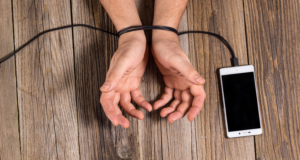How to Test for Gaming Addiction
By nature, addictions are difficult to diagnose. One reason is that many addicts are in denial about their addiction and see no issue with their addictive behaviors. In addition, there’s no foolproof test for addiction of any kind. Instead, diagnosis is often based on symptoms, warning signs, and how a particular behavior is negatively impacting a person’s life.

Some addictions, like those to drugs or alcohol, come with very obvious and very troubling physical side effects. These include weight loss or gain, medical complications, dry or cracked skin, dental problems, and many more.
Unfortunately, behavioral addictions like gaming addiction aren’t always as easy to diagnose. Most addicts must look to their symptoms to determine just how much their addiction is impacting their daily lives. In this article, we’ll cover how to test for gaming addiction and the symptoms and signs to look for when making a diagnosis.
Content
Online Addiction Tests
Did you know that there are online tests available that test for gaming addiction? While this is a resourceful tool for potential addicts, it’s also highly subjective. Most of these online tests are simply questionnaires that require honest, unbiased responses. Questions often surround how long you play video games, how you feel when you can’t play, and other probing questions to help uncover evidence of gaming addiction.

To get the most out of these tests, you have to be open, honest, and willing to change. If you’re skeptical but open-minded, about the fact that you may have a gaming addiction, these online tests will bring the truth to the light. If, on the other hand, you use an online test to prove to yourself that you don’t have an addiction, you’ll likely answer the questions in hopes of creating the result you want. This isn’t doing you any good and won’t help you overcome your addiction.
Let’s take a closer look at some of the questions and techniques used in these online tests to help determine if your habit of playing video games has turned into an unhealthy obsession.
At-Home Tests to Try
By taking an honest, objective look at your current situation and performing a few at-home experiments, you can get one step closer to recovery.

Detox for One Week
Detox is a common and effective method for overcoming video game addiction. But it can also work as a useful tool for testing just how addicted you are. Dedicate yourself to not gaming for one straight week. This includes no computer games, mobile games, or games on a console.
Right now, at this moment, gauge how you feel just reading that. Does the thought of no video games for 7 days cause you to feel panicked or anxious? Or are you thinking, “No problem. I can do this.”? Your reaction alone will tell you a lot about the extent of your addiction.
Once you make the decision to detox for one week, keep a journal of your feelings every day. Write down how often you get the urge to play, what triggers that urge, and how you react. If eliminating video games from your life is easy, chances are, you have a healthy relationship with video games and can play in moderation with no negative side effects. If instead, you struggle every day (or even every hour) to avoid gameplay, you may have an addiction. Gaming addicts may also notice physical and emotional side effects during the detox process. These include difficulty breathing due to anxiety, irritability, increased stress, mood swings, sadness, or even depression.
If you’re experiencing any of these side effects when video games are removed from your life, chances are you might have an addiction. You may also have an unhealthy dependency on video games for creating feelings of happiness, relaxation, and pleasure.
Ask Family and Friends
Many addicts struggle to see the reality and severity of the situation. The majority of addicts are in denial that they have a problem. This often stops them from getting the help they need. Their denial happens for countless reasons including embarrassment and shame, to fear of losing their substance of choice. If an addict admits they’re addicted, they know the next steps toward recovery include limited access to the stimulus — in this case, video games.
Self-help programs for video game addiction usually offer a great compromise as users work on their addiction on their own terms without the worry of judgement from others.
However, If you’re ready and willing to hear an objective opinion about your gaming habits, ask those closest to you. Your family, friends, and loved ones will likely be more than happy to give you their honest opinion. Ask them some of the following questions.
- Do I constantly talk about video games?
- Does my mood change when I can’t play video games?
- Have I become more isolated or anti-social?
- Do I game too much?
Obviously, these questions are extremely subjective. For example, your spouse or parent might think you game far too much whereas a friend or coworker may not notice anything. Be honest with yourself about who knows you best. Ask those who will give you the honest, and sometimes tough, answers. And remember why you’re asking. If you’re truly in search of help or concerned your habit has become an addiction, listen with an open mind and avoid getting defensive.
Replace Video Games with Other Healthy Activities
Most people turn to video games as a form of entertainment. When used in moderation, video games are a great way to unwind from a stressful day, interact with like-minded gamers, and forget about your obligations for a short period of time. Plus, they’re just fun! That’s why the average gamer is 34. Adults play more video games than children as a way to destress and engage in carefree entertainment.
A good way to test if video games are just one tool you use to destress versus a crutch you rely on as your sole source of happiness and escape is to replace it with a different habit or activity. Instead of playing video games, try exercising or taking a yoga class. Exercise is a great way to boost endorphins, increase energy, and destress. Explore your creative side by taking an art class or trying a new craft. You can also socialize by joining a book club or by volunteering.
Determine what it is about video games that you enjoy so much and find an alternative activity that offers the same benefits. If making this switch is easy and has a positive effect on your life, you may not be as addicted to video games as you once thought. If instead, you can’t focus on the new activity or are preoccupied thinking about video games instead of focusing on the task at hand, you may be addicted to the stimulation and pleasure that video games provide.
Check Your Financials
One side effect of gaming addiction that many people overlook is financial hardship. Like any addiction, the desire to fulfill your urges often trumps all else including work, responsibilities, and financial obligations. Sit down and take an objective look at your finances. Numbers don’t lie. If you’re behind on your rent or are racking up credit card bills paying for Runescape memberships or mobile microtransactions, it may be a sign that you’re addicted to gaming. It’s also a sign that your judgment has been compromised as you’re putting video games before basic obligations and responsibilities.
The same can be said if your job has been compromised due to gameplay. Calling out of work, showing up late, shirking assignments, or playing while at work are all dangerous behaviors that can impact your financial livelihood and may even get you fired. Examine your monthly expenses and income to determine if you’re staying on budget or if you’re overspending on gaming.If you happen to be eagerly awaiting DLC that you can’t afford or investing in skins you don’t need, these spending habits can say alot about your affinity for video games.
Other Gaming Addiction Symptoms to Consider
Sometimes, the best way to test for gaming addiction is to merely take an objective look at your current lifestyle. The signs and symptoms of gaming addiction are usually pretty clear and often overlap. Here are a few other ways to determine if you’re addicted to video games.

Compromised Relationships
Isolation is a common side effect of gaming addiction. Hours spent inside, alone, playing video games can not only cause feelings of sadness and depression but may impact your current relationships. Strained marriages and friendships are a common casualty of playing too many video games. Some gamers become so consumed with the gaming community and chat groups that they struggle to form real bonds outside the gaming world. If you find yourself losing touch with friends and family because you’re too busy playing video games, it may be time to evaluate your gaming habit.
Poor Hygiene
When nothing matters but video games, many players overlook basic hygiene and grooming. Failing to take showers, forgetting to brush your teeth, skipping meals, and staying in the same clothes for days on end are all indications that you have an unhealthy connection to video games. Poor hygiene can also impact your self-worth and confidence. For many addicts, one day blends into the next as they spend countless hours gaming, losing all sense of time and reality.
Health Complications
Over time, it’s inevitable that some of the above-mentioned symptoms can lead to serious medical conditions and complications. Headaches and blurred vision are common among gaming addicts that spend too much time staring at a screen. Neck and back pain is also caused by poor posture or sitting in a chair or couch for too long. Weight loss or weight gain is also common in gamers who either overeat or forgo meals to play. Repetitive strain injuries are another common side effect of gaming addiction. If you notice any of these physical symptoms, you may need to test for gaming addiction and seek help.
Life After Gaming Addiction is Possible
Testing for gaming addiction is a must if you suspect gameplay is ruling your life. Knowing the signs and symptoms of addiction is the first step in uncovering the truth and setting yourself free.

At The Mindful Gamer, we offer a multi-faceted approach to overcoming gaming addiction. We use a combination of therapies, activities, and resources to help you identify, come to terms with, and overcome your addiction. Explore the rest of our blog for more useful articles on gaming addiction and its effects.








